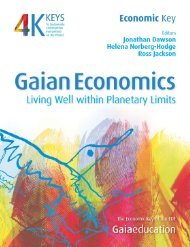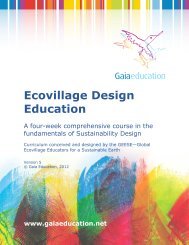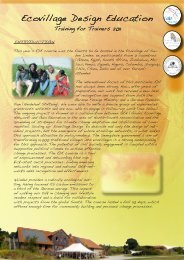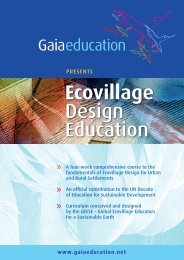Designing Ecological Habitats - Gaia Education
Designing Ecological Habitats - Gaia Education
Designing Ecological Habitats - Gaia Education
You also want an ePaper? Increase the reach of your titles
YUMPU automatically turns print PDFs into web optimized ePapers that Google loves.
green builDing in termperate climates 77<br />
Labour versus Money<br />
As the state of our global economy seems to be moving further away from<br />
‘reliable’, and as people all over the world have varying access to financial<br />
capital, it is a profound statement of security and resilience if the need for<br />
financial income can be reduced by economic self-sufficiency. Not only can<br />
people grow food in their own or the community’s gardens, but building a<br />
house can be done with your own head and hands and those of some friends<br />
or economic partners. Working directly on the construction of one’s own<br />
house reduces the need to earn money by selling one’s labour on the market<br />
in order to pay back debts and interest through credit buying. The more<br />
uncertain employment possibilities become in industrialized countries, the<br />
starker will be the difference between conditions of families who have built<br />
rather than bought their new home.<br />
The cost of the construction materials for a high standard strawbale<br />
house is about 50% of the total cost of building it. By using simple<br />
construction techniques, reused material and aiming at a lower standard<br />
even less investment is possible. The cost of erecting the building out of<br />
these materials is dependent upon the builder’s knowledge, practical skills,<br />
organizational talents and time. Therefore, natural building with strawbales<br />
can provide affordable housing for low-income social groups in many parts<br />
of the world, especially in rural areas.<br />
Creating Social Community<br />
A socially healthy community is profoundly based on its economic<br />
conditions. The possibilities of meeting the needs of people by following the<br />
principles of a regionally resilient economy have been shown above.<br />
Mutually helping each other within neighbourhoods will create bonds that<br />
work as a basis for creating even more together. Along with this, building with<br />
strawbales has shown an incredible interest amongst people wanting to<br />
immerse themselves more fully into<br />
world changing activities. Working on<br />
a strawbale construction site means<br />
acquiring new skills and gaining experiences<br />
of personal empowerment.<br />
Many enthusiasts have joined networks<br />
of like-minded people in different<br />
countries, inviting interested people<br />
to assist in strawbale workshops or<br />
‘public wall-raisings’ (this is a ritual in<br />
some places where locals are invited<br />
for a day of raising together the strawbale<br />
walls of a new building). The<br />
annually organized European Strawbale<br />
Gatherings (ESBG) demonstrate both<br />
a growing and professionalizing move-<br />
kg CO 2 per one family house<br />
20000<br />
15000<br />
10000<br />
5000<br />
0<br />
-5000<br />
-10000<br />
-15000<br />
straw bales<br />
15396<br />
cellulose<br />
1402<br />
CO 2 Balance<br />
mineral wool<br />
-10416







